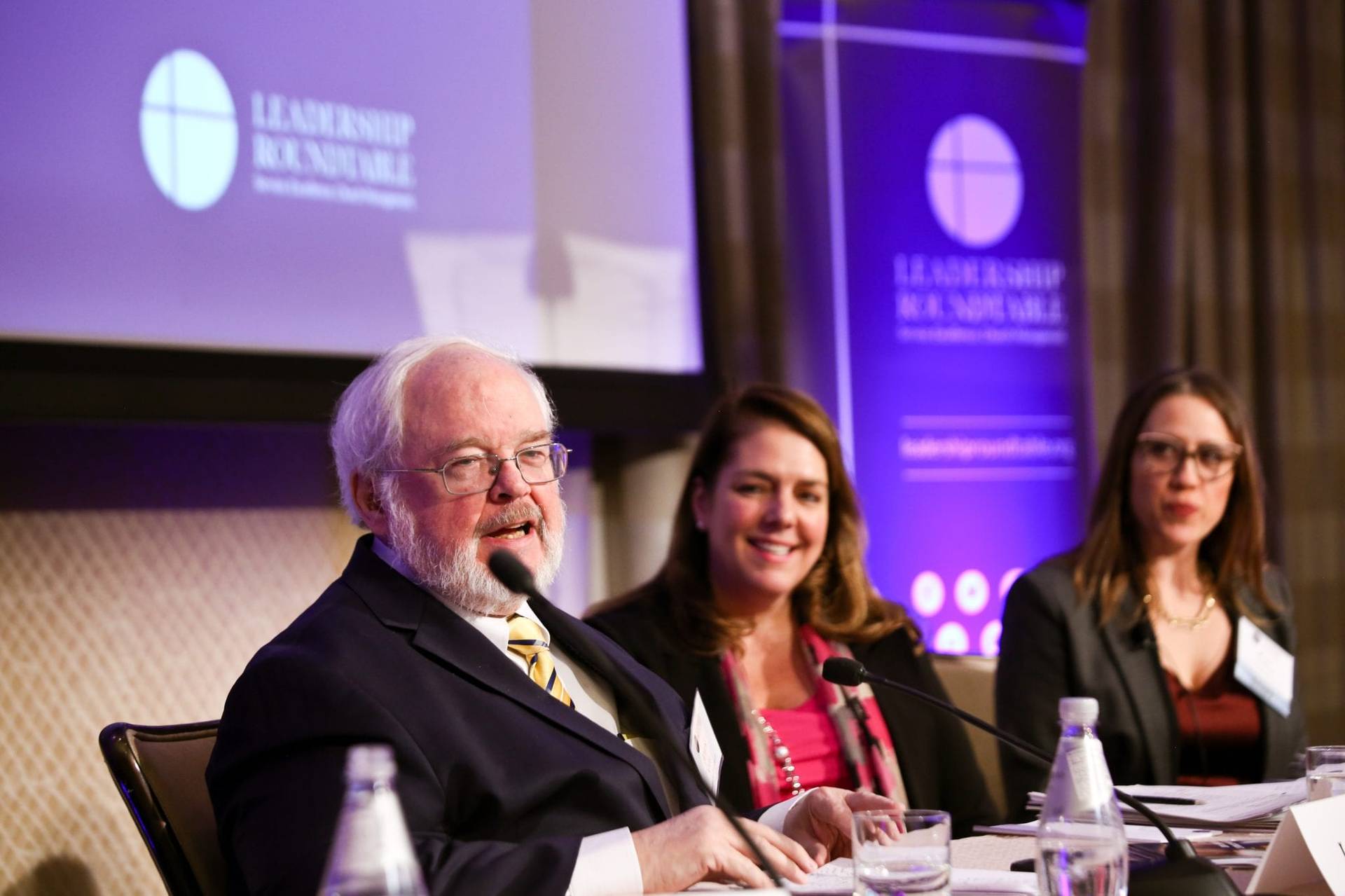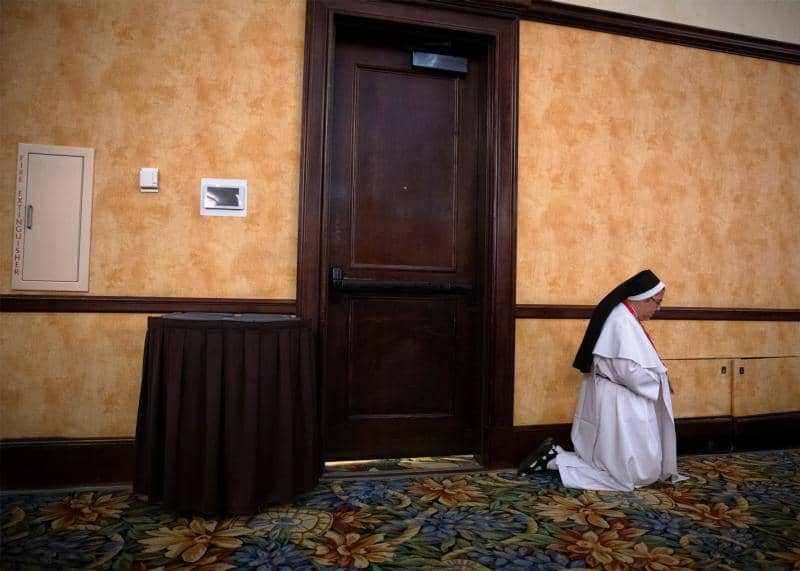ABOARD THE PAPAL PLANE — Pope Francis on Tuesday acknowledged the problem of Catholic nuns being sexually abused by priests and bishops, saying the Church needs to do more to address it. He also said that the killing of those who refuse to convert to Islam, including Christians, is unfortunately “our daily bread.”
The pope spoke to journalists aboard the plane carrying him back to Rome following a Feb. 3-5 visit to the United Arab Emirates, the first-ever papal outing to the Arabian Peninsula.
Abuse of nuns by clergy
Francis was asked about a series of articles in the women’s magazine of the Vatican’s newspaper L’Osservatore Romano, objecting to the reality that religious sisters often have no protection from sexually abusive priests who force themselves on them and, if they become pregnant, often compel them to have an abortion.
The matter was raised in Women, Church, World, a monthly supplement. Such reports have circulated at least since the late 1990s, when the National Catholic Reporter published several internal documents from women’s orders detailing the problem, which tends to be especially pronounced in the developing world.
The Vatican article claimed that nuns have been silenced for years by fear of retaliation against themselves or their orders.
“Mistreatment of women is a problem,” Francis said in reply. “I would say that humanity still hasn’t matured. Women are treated as second class. It’s a cultural problem … in some countries, the mistreatment of women goes as far as femicide.”
Speaking specifically about the Church, the pope said that abuse of women by clergy exists: “I cannot say no, in my house we don’t have this problem.”
“I’m glad that we’re working on this,” he said. “Some priests have been removed [from the priesthood] because of this.”
“Do we need to do more? Yes. Is there the will to do more? Yes. But it’s a path that takes time,” he said, saying that some female religious orders have been suppressed due to “sexual corruption,” even at the hands of the founder.
Francis also spoke about Pope emeritus Benedict XVI, saying that he had had the “courage to do a lot about this issue,” including suspending a female religious congregation (the French order of St. Joan, as the founder was accused of sexually abusing female members.)
Francis said that when Benedict was the head of the Vatican’s Congregation for the Doctrine of the Faith (CDF), he tried to suspend a “religious order that had sexual and economic corruption” but failed because he “lost” at a meeting with St. Pope John Paul II and others.
“We mustn’t be scandalized by this,” Francis said, noting that as soon as he was elected pope, Benedict went back to the archives of the CDF and began to work on it. Though he gave no details, many observers will presume the Argentine pontiff was referring to the Legion of Christ.
The folklore around Benedict, Francis said, painting him as “weak,” is unfounded, because “he was a strong, determined man. It was he who began addressing this issue [of clerical sexual abuse].”
Venezuela
Venezuelan leader Nicolas Maduro recently told Italian TV Sky24 that he’s sent a letter to the pontiff, saying that he’s “at the service of the cause of Christ, I’m deeply Christian,” and that with “this spirit I have asked for his help in a process of facilitating the reinforcement of dialogue.”
“We hope for a positive response,” Maduro added.
Italian Cardinal Pietro Parolin, the Vatican’s Secretary of State, was asked by Crux about the letter on Monday, when a group of journalists approached him at an interreligious event hosted in Abu Dhabi. Parolin confirmed that Maduro had sent a letter and that there was a renewed intention for dialogue but refused further comment.
On Monday, several European countries, including the United Kingdom, France and Spain, announced they were recognizing opposition leader Juan Guaido, president of the National Assembly, as the interim leader in Venezuela. He took an oath of office on Jan. 23 in a challenge to Maduro’s claim to have been reelected in 2018.
Supporting Maduro are Russia, Turkey, and Mexico.
The pope, following long-standing Vatican tradition, has decided the Holy See will stay out of the conflict, not expressing support for one or the other. However, when asked by reporters if he’d be willing to formally mediate, much like the Vatican did in 1972 between the pope’s native Argentina and Chile, that were on the brink of war, Francis said both sides have to be open.
“Before the trip I knew the letter [from Maduro] was coming, through diplomatic courier, that this letter from Maduro was coming. I still haven’t read it,” he said.
“We’ll see what can be done. But for there to be a mediation, and this is the last step [in diplomacy] the will of both sides is needed. Both sides have to ask for it. This was the case with Argentina and Chile.”
The Holy See has been involved in earlier dialogue attempts over the Venezuelan situation, but as Francis said on Tuesday, “nothing came out of it.”
Christian persecution and religious freedom
On Monday night in the UAE, during the signing of an interreligious declaration on human fraternity, coexistence and peace, the Grand Imam of Al-Azhar, Cairo’s university, condemned Islamophobia. Asked about why no one had spoken out against Christian persecution, Francis said he had and that he’s done so many times before.
He also noted that despite being a document about “unity and friendship,” the declaration also condemns the violence of some groups that call themselves Muslim and persecute Christians.
The killing of those who follow Jesus and refuse to convert to Islam, Francis said, “is our daily bread.”
Francis departed the UAE after celebrating the first-ever public Mass in the country’s history, attended by some 130,000 people from 100 nations. Most are generally banned from publicly expressing their faith under the laws and customs that govern the overwhelmingly Muslim nation.
Asked about the possibility of the event he led on Tuesday leading to actual religious freedom, Francis said it’s a “process,” and all processes have a beginning. Once they start, he said, there’s a before and after.
When it comes to religious freedom in the UAE, he said he believes it’s a process that has begun but which must continue.
Speaking about the document signed by him and Imam Ahmed al-Tayyeb, the pontiff said that even though there are some who might not like the text, it doesn’t deviate from the Church’s teaching and that it’s rooted in the Second Vatican Council.
“For me there’s only one big danger right now: Destruction, war, hatred among ourselves,” he said. “And if we believers aren’t capable of shaking hands, hugging, kissing and even prayer, our faith will be defeated.”
“God is the father of everyone and the father of peace,” Francis noted. “He condemns each [act of] destruction and terrorism.”
The pope also noted such violence has a long history.
“The first terrorist act in history was that of Cain [who killed his brother Abel],” he said.














